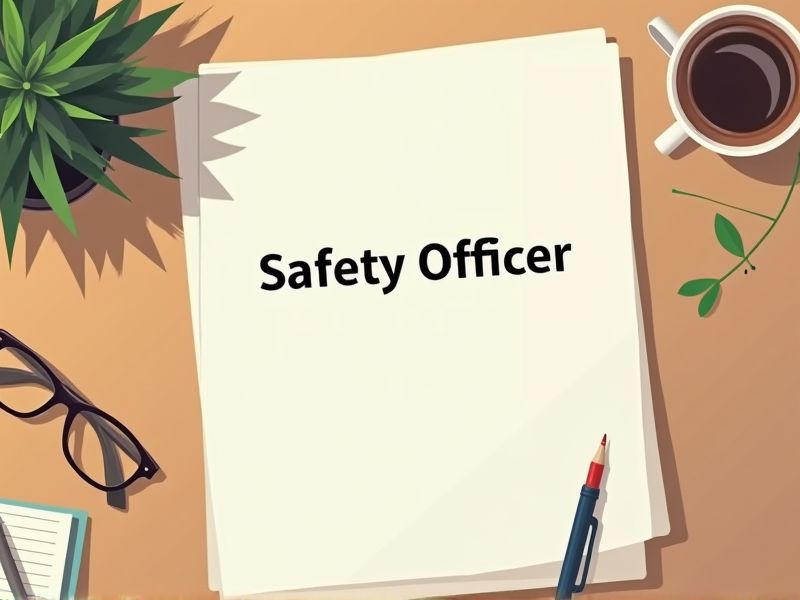
Safety Officers play a pivotal role in ensuring workplace safety, and their effectiveness hinges on possessing specific knowledge and skills. Certifications provide standardized, up-to-date training on industry regulations, emergency response, and hazard control, which enhance their capabilities. These credentials also build credibility and enhance trust among employers and employees, ensuring compliance with legal safety standards. Here are some important certifications you may need to consider for a career as a Safety Officer.
OSHA 30-Hour General Industry Certification
The OSHA 30-Hour General Industry Certification provides comprehensive knowledge on occupational safety, enabling Safety Officers to effectively identify and mitigate workplace hazards. This certification enhances a Safety Officer's ability to comply with federal safety regulations, thereby reducing the risk of legal liabilities for their organization. With a deeper understanding of safety protocols, a certified Safety Officer can improve the overall safety culture within a workplace, leading to fewer accidents and injuries. Possessing this certification often increases a Safety Officer's credibility and employability, as many employers prefer candidates with recognized safety training.
OSHA 10-Hour General Industry Certification
The OSHA 10-Hour General Industry Certification equips Safety Officers with essential knowledge on workplace hazard identification and mitigation. This training helps in reducing the likelihood of accidents and injuries, enhancing overall workplace safety. Employers often require this certification to ensure that Safety Officers possess a foundational understanding of health and safety protocols. With OSHA certification, a Safety Officer's credibility and competence in managing compliance with safety regulations increase, thus reinforcing the organization's commitment to a safe working environment.
Certified Safety Professional (CSP)
Having a Certified Safety Professional (CSP) designation often leads to enhanced credibility for safety officers, which can foster greater trust and cooperation in the workplace. The certification requires rigorous examination and ongoing education, ensuring safety officers are staying up-to-date with current safety regulations and standards. Employers often seek CSP-certified individuals due to their proven expertise, potentially increasing job opportunities and career advancement. The CSP designation can also bolster a safety officer's ability to develop effective safety programs, ultimately reducing workplace incidents and improving overall safety culture.
Associate Safety Professional (ASP)
Employers often require an Associate Safety Professional (ASP) certification for Safety Officers due to its validation of core knowledge in safety management and practices. Holding an ASP certification can enhance a Safety Officer's credibility by demonstrating a commitment to maintaining high safety standards. The ASP credential serves as a benchmark for measuring a Safety Officer's ability to effectively identify and mitigate workplace hazards. Safety Officers with an ASP certification are more equipped to develop comprehensive safety programs, which can lead to reduced accident rates and improved worker protection.
NEBOSH International General Certificate in Occupational Health and Safety
Holding a NEBOSH International General Certificate equips a Safety Officer with the essential knowledge to identify and control workplace hazards. This credential enhances the officer's ability to ensure legal compliance and reduce accident rates. Employers often require the qualification for demonstrating a commitment to maintaining a safe work environment. The certification supports career advancement by legitimizing professional competence in health and safety management.
NEBOSH National General Certificate in Occupational Health and Safety
The NEBOSH National General Certificate provides foundational knowledge in occupational health and safety, which is essential for safety officers to effectively manage workplace risks. This certification enhances the safety officer's ability to implement and maintain safety standards, leading to reduced incidents and improved compliance with regulations. Employers often require NEBOSH certification to ensure that their safety officers possess a recognized level of competence and professionalism. As a result, safety officers with this certification are better equipped to influence and promote a culture of safety within the organization.
First Aid, CPR, and AED Certification
Safety officers often encounter situations where immediate medical intervention can prevent escalation of injuries. Certification in first aid, CPR, and AED enables them to provide crucial care in emergencies, reducing the risk of fatalities. Training in these areas also instills confidence in both the safety officer and the individuals under their supervision. Certification enhances the overall safety culture within an organization by promoting proactive readiness and response capability.
HAZWOPER Certification
Safety officers require HAZWOPER certification because it ensures they have the training to handle hazardous substances safely, reducing the risk of workplace incidents. This certification provides critical knowledge on emergency response and best practices in managing hazardous wastes, thereby enhancing site safety. Without it, safety officers may lack the expertise to effectively manage and mitigate potential hazards. Employers often mandate this certification to comply with OSHA regulations, ensuring both legal compliance and the well-being of workers.
Incident Investigation Certification
Safety officers with Incident Investigation Certification tend to effectively identify root causes of workplace incidents. Being certified enhances their capability to implement corrective measures, reducing the likelihood of accidents. The certification equips safety officers with standardized methodologies that ensure comprehensive investigations. Organizations benefit from certified safety officers as they improve compliance with regulatory requirements and foster a safer workplace environment.
ISO 45001 Occupational Health and Safety Management Systems Lead Auditor Certification
The ISO 45001 Lead Auditor Certification equips safety officers with a comprehensive understanding of international standards, thereby increasing their ability to effectively implement and audit occupational health and safety management systems. Enhanced auditing skills enable them to identify potential hazards and non-compliance issues, ultimately reducing workplace accidents and improving employee safety. Holding such certification often results in better recognition and credibility, which can advance career opportunities within occupational health and safety fields. Organizations benefit from certified personnel by ensuring consistent compliance with safety regulations, thus minimizing legal risks and enhancing overall organizational performance.
Summary
When you acquire certifications as a Safety Officer, your expertise is formally recognized, which can lead to increased credibility in the workplace. This recognition often translates into more opportunities for leadership roles and career advancement. Organizations may place greater trust in your ability to implement and oversee effective safety protocols. Enhanced job security and the potential for higher compensation packages are also likely outcomes of obtaining such certifications.
